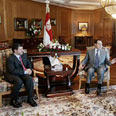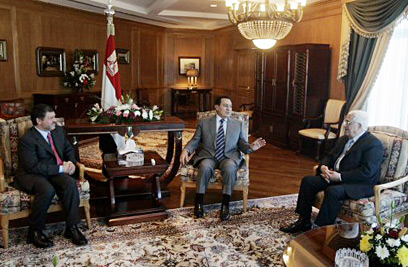
Egypt talks with Abbas, Abdullah ahead of peace meet
Talks aimed at 'consultation and coordination', Egyptian diplomat says. 'If the summit launches serious sustained negotiations on final status issues with a follow-up mechanism that is feasible, I think it will be a great step forward,' he adds
Egyptian President Hosni Mubarak held talks on Thursday with Jordan's King Abdullah and Palestinian President Mahmoud Abbas to coordinate positions ahead of a US-sponsored peace conference.
Egypt, a key US ally in the Middle East and one of only two Arab states to have signed a peace treaty with Israel, has offered support for next week's meeting in Annapolis, Maryland on the creation of a Palestinian state, despite initial reservations.
"If the summit launches serious sustained negotiations on final status issues with a follow-up mechanism that is feasible, I think it will be a great step forward," an Egyptian diplomat said. He said Thursday's talks aimed at "consultation and coordination."
Egyptian presidential spokesman Suleiman Awad told reporters a proposed follow-up mechanism to Annapolis would entail a series of meetings to review progress on both sides.
The talks would "discuss the obstacles hindering negotiations, and try to extend a helping hand to both the Palestinian and Israeli sides," said Awad. Moscow and France had been touted as possible venues for follow-up meetings, he said.

Abbas, Mubarak and Abdullah (Photo: AFP)
The United States has invited about 40 countries - including Saudi Arabia and Syria, which have no relations with the Jewish state - to the meeting it hopes will launch negotiations to end the six-decade Israeli-Palestinian conflict.
It was unclear how far the conference will go to tackle the core issues – borders, security, settlements, the status of Jerusalem and the fate of Palestinian refugees – that have defeated previous efforts to end the conflict.
Israeli and Palestinian negotiators have been struggling to hammer out a joint document before the conference that would address core issues in general terms, and Awad said it was unclear whether a document would be ready by Tuesday.
"Either we go with one joint document that has been agreed upon, or each side presents its own position," Awad said.
Israeli officials said they also expected a deal before the gathering, but differences remained. Yasser Abed Rabbo, an Abbas aide, said on Voice of Palestine radio that a timeline to end talks within a year would be announced at the conference.
Will Saudis attend?
There was still no final word on whether Saudi Arabia or Syria would attend the conference, although Saudi Arabia has not ruled out the possibility of taking part, according to comments by Crown Prince Sultan carried on state television.
Arab and Western diplomats say that Riyadh may decide at the last moment to send its foreign minister, but is more likely to send low-level representatives.
Saudi Arabia's participation could bolster Abbas's ability to reach an agreement and help Olmert sell it to Israelis by holding out the prospect of wider peace with the Arab world.
The final word on attendance may emerge after Arab foreign ministers meet in Cairo on Friday to take a common position.
US ally Oman said on Thursday it would attend. Egypt has confirmed too, but is not expected to press other Arab states publicly.
"Each country has its own interests and its own view of how to assess the situation," the Egyptian diplomat said.
The Palestinians are themselves divided between Abbas's Fatah movement, which governs the West Bank, and the Islamist Hamas group, which seized control of the Gaza Strip in June.
Speaking on Israel Radio, Defense Minister Ehud Barak reaffirmed a final agreement would not be implemented until Palestinians carry out commitments to crack down on militants under a 2003 US-backed peace Road Map.
Barak said that meant action against militants must also be carried out in Gaza. Senior Palestinian negotiator Saeb Erekat said Abbas regarded the West Bank and Gaza as a single entity and understood the road map requirements covered both.










